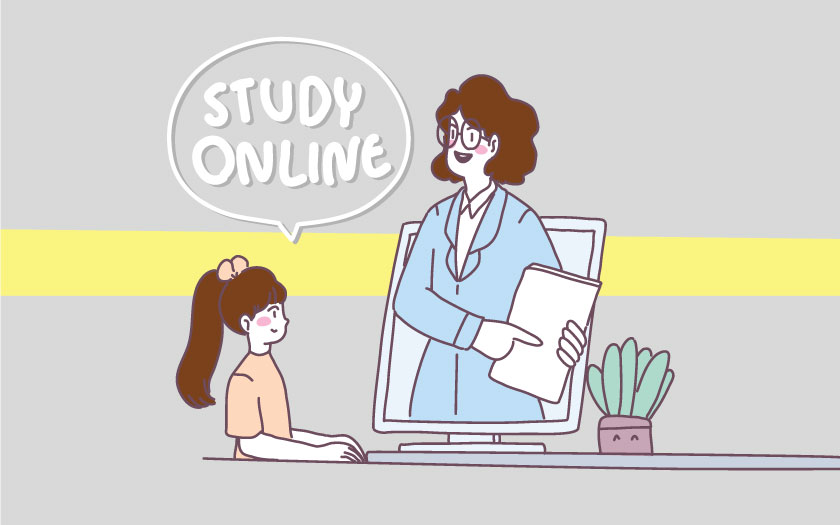Since the pandemic hit, the world of education has turned topsy-turvy as teachers and students alike struggle to adjust to online classes and all the challenges that come with it, and on a large scale too! It’s been tough on teachers and students, but no less tough on parents too, especially those with kindergarten children!
BabyTalk had an opportunity to obtain the views of an expert on these matters, Ms Wong Poh Swan, the Assistant Head of the Diploma In Early Childhood Programme at MCKL. Here’s what she had to say to a few of our pressing inquiries.
BT: Now that a large portion of education, including kindergarten classes, has been geared towards online learning, what are the main challenges that parents may be facing, and how can they get around it?
Ms WPS: With online learning transforming our children’s learning milieu, parents are undeniably presented with a host of new challenges as they are expected to react swiftly to an unprecedented teaching and learning scenario. There is now a paradigm shift in roles between teachers and parents, with parents having to assume a more active, if not, larger role in their children’s online learning. When there is an added engagement required from parents in online learning, one of the main challenges that parents may be facing is having to balance their existing household responsibilities, work commitments and their children’s online learning simultaneously.
To navigate around this, it is recommended that parents plan ahead and set up a sustainable schedule and routine that best accommodate their needs and their children’s needs. Set up a structured schedule and consistent routine, just like a school’s: allocate time for learning, breaks, meals, and play. Children respond better to a routine as it provides them with a sense of security and control. This alleviates their anxiety over this new mode of learning and in turn, reduces any possible behavioural issues. Hence, some planning ahead in establishing a new family routine may help in reducing household and work stress whilst supporting children’s learning from home.
BT: To what degree do parents have to involve themselves so as to ensure that their children do not fall behind in their early education?
Ms WPS: With or without the pandemic, parent’s involvement in their children’s educational needs is and should always be present. However, with intermittent closures of schools during the current pandemic, parents should, to a large extent, proactively involve themselves in their children’s early education to ensure that there is learning continuity.
Parents can be involved by acting as their children’s motivators or cheerleaders, by encouraging and reinforcing their children’s efforts, engagement and completion of learning tasks. Parents can also act as mentors or counsellors, by guiding their children through their online learning activities and showing that they care and understand the challenges this unconventional form of learning presents.
Parents tend to underestimate their role as an important source of motivation for their children. However, such parental involvement has a significant impact as it has been shown to be very effective in fostering children’s educational success and lifelong learning.
BT: What are the ramifications of parents not taking their children’s kindergarten classes seriously?
Ms WPS: To an extent, even if some parents are not taking their children’s kindergarten classes seriously, whether there are ramifications and how serious or significant they are, depends on whether there is still meaningful learning taking place at home.
Serious ramifications would only come about when children do not experience any learning at all. This may tantamount to learning losses which may put the children at risk of not achieving the educational outcomes expected of them. Consequently, the children may feel overwhelmed or discouraged when they return to classes due to the steep learning curve they may experience having to play catch-up.
Conversely, if children are still endowed with many learning opportunities at home through various means and forms such as books, play and art, albeit not through online classes, learning gaps, if any, would not be substantial.
BT: Education gaps are sure, to some degree, inevitable when it comes to kindergarten learning today, especially in the midst of a pandemic. How can parents help in this regard, to help close or reduce this gap?
Ms WPS: The pandemic has surely exacerbated pre-existing education gaps by reducing the learning opportunities for some marginalised groups, particularly those who have unequal access to internet connectivity and technological devices. To bridge this gap, parents, with the concerted effort from teachers, can still provide children access to education through paper-based and take-home learning kits or even educational television programmes. Learning tasks can also be provided by teachers through SMS, with instructions and solutions included.
In essence, parents should endeavour in providing their children with various learning opportunities, outside of school. Such learning opportunities need not be conducted like how a teacher formally conducts a class. Meaningful and purposeful learning can still occur informally at home, and its outcomes are equally as impactful. Through informal learning opportunities, parents can help their children to develop skills and reinforce understanding of certain concepts learned.
Parents may not be experts in academic subjects, but they can impart their knowledge on certain life skills and learning skills. Through conversations and taking advantage of teachable moments in their children’s daily lives, parents can help children make meaningful connections between their classwork and real-life experiences. For instance, a simple baking activity at home opens boundless learning opportunities – language and literacy from reading the recipe, mathematics from measuring ingredients, science from observing changes when ingredients are mixed or heated and art and craft from decorating the baked goods, just to name a few.
BT: How are parents’ mindset linked to the way their children undertake their kindergarten classes today?
Ms WPS: Parents’ mindset, attitudes, perception, and beliefs have a rippling effect on their young children and therefore would have a close link to the way their children undertake their kindergarten classes. Children learn through imitation and their social observations. If parents have a positive mindset and model how to engage in learning activities with a positive attitude towards learning, children too will adopt the same mindset. Children, after all, are quick in adopting behaviours that they constantly observe. Therefore, if parents wish for their children to remain committed in their classes, parents must first reflect this in their own actions and words.
BT: How can good communication and a good parent-teacher relationship help a kindergarten student fare better today?
Ms WPS: As the old adage goes, “It takes a village to raise a child”, and this is even more relevant and needful in today’s volatile world. A supportive communal and ecological system would surely help the children fare better in their education. By having good communication and a good parent-teacher relationship, both parties can coordinate their efforts in aligning their understanding as well as goals for the children. Following children’s positive engagement during learning, motivation to learn and educational achievements will increase when they see the consistency in practices and the strong interest in their learning, both at home and in school.

Assistant Head of Programme,
Diploma in Early Childhood, Methodist College, Kuala Lumpur (MCKL)


